openinternet
Latest
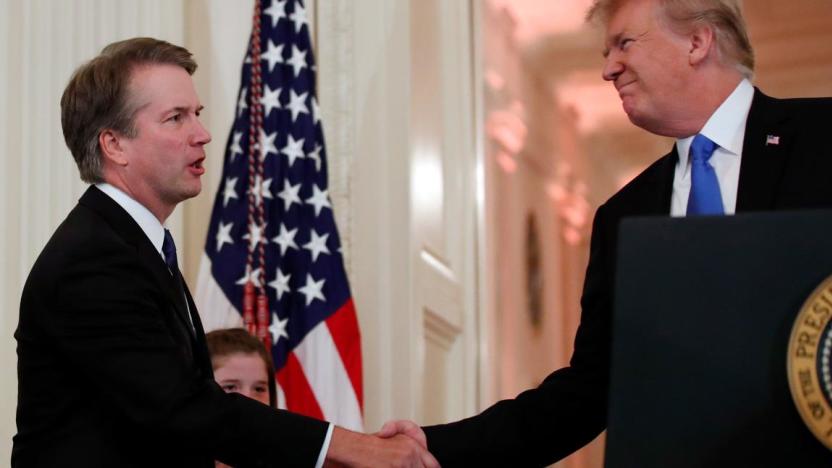
Our (likely) next Supreme Court justice doesn't get the internet
Barring some serious Democratic finagling, Judge Brett Kavanaugh is going to be our next associate Supreme Court justice. The problem is, he doesn't really get the internet. He made as much clear in a dissenting opinion he wrote in the thick of last year's net neutrality debate. Long story short, a panel of judges from the D.C. Circuit Court of Appeals upheld the FCC's 2015 Open Internet Order in 2016 after it was challenged by a coalition of telecom and cable companies. Those organizations then petitioned for a second hearing in front of the entire court, and were shot down again (.pdf here) in 2017. Kavanaugh disagreed with the court's decision, and then proceeded to lay out arguments for why the FCC's net neutrality rules were "unlawful."

Hypocrisy at the FCC and the illusion of transparency
Less than two weeks after being named chairman of the Federal Communications Commission, Ajit Pai said one of his priorities was to "make the agency's operation more transparent," beginning with a pilot program to release internal documents pertaining to upcoming FCC meetings. It was a nice sentiment, and one that — on its face — seemed to be an attempt on Pai's part to do the right thing. If sunlight is the best disinfectant, surely shedding more of it on a government agency that deals in massively important, far-reaching technical policy is a good thing... right?
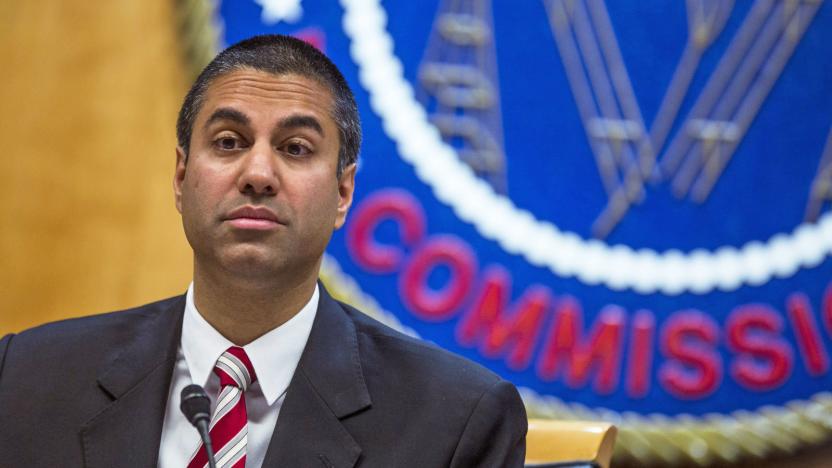
What you need to know about net neutrality (before it gets taken away)
You've probably heard of "net neutrality" by now. It's been in the news again as the FCC introduced a proposal last week to reverse regulations put in place in 2015. Yes, we just went over this two years ago, but in two weeks, those regulations could be undone. FCC Chairman Ajit Pai wants to roll back the FCC's current regulations that classify broadband internet as a utility-like tool for communication (like the telephone), categorizing it instead as an information service. This change would lift bans on throttling, blocking and paid prioritization, as well as reduce the amount of data companies would have to report.

The internet needs us to save net neutrality
Today, thousands of websites and organizations are showing their support for net neutrality in hopes of preserving the open internet. Consider Engadget among them. The Federal Communication Commission, as chaired by former Verizon lawyer Ajit Pai, is exploring ways to repeal the open internet rules put into effect by former chairman Tom Wheeler, and that's just not OK.

The FCC doesn't care what you think about net neutrality
By now, you've probably heard what FCC Chairman Ajit Pai has in store for the internet in the United States. If not, here's the short version: Pai wants to strip the internet of its current status as a "common carrier" under Title II of the Telecommunications Act, roll back the "internet conduct standard" (a vague list of things service providers can't do to interfere with your online experience) and open a discussion about whether we need specific "bright-line" rules that prohibit blocking, throttling and paid prioritization. You may agree with Chairman Pai's assessment of the situation, or you might not. (For the record, most of us around here don't, for reasons we've made clear in the past.)

FCC chairman Tom Wheeler will step down next month
Next month, net neutrality will lose one of its stronger advocates -- FCC chairman Tom Wheeler has just announced his plans to step down on January 20th, 2017. Not coincidentally, that's the same day that President-elect Donald Trump is set to take office. With a new administration taking over, it's tradition for the FCC's chairman to step aside and let the incoming president present his own pick for the job.
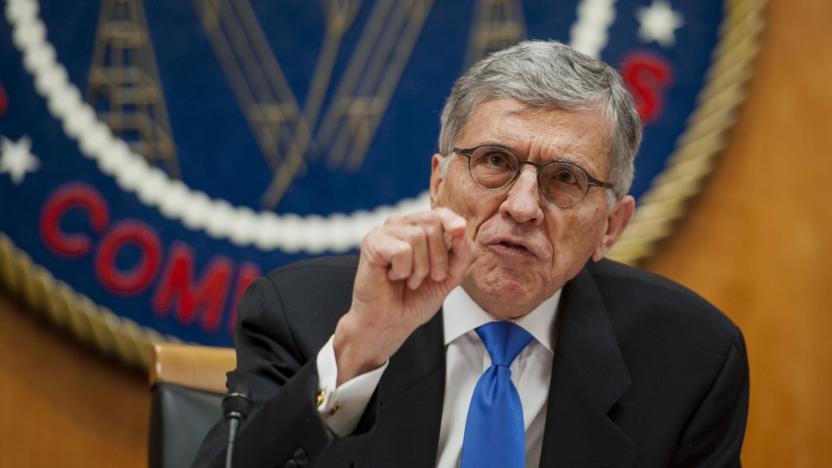
FCC labels ensure you get your daily dose of internet
The FCC passed its so-called Open Internet guidelines last year, and much of the talk focused on the practice of net neutrality. Those rules also reclassified broadband service as a utility and discussed steps for increased consumer protections, including consumer broadband labels to explain cost details and more. Revealed today by the FCC, the new labeling system offers information on pricing, data allowance and network performance so that customers can easily find the information they seek before signing up with a service provider.

FCC shoots down petitions to delay open internet rules
Remember when a wolfpack of cable companies and telecoms -- including AT&T, CenturyLink, the American Cable Association, USTelecom and more -- filed motions to delay the FCC from enacting parts of its open internet order? Well, the Commission was having none of that. Late in the day this past Friday, Wireless Competition Bureau chief Julie Veach and Wireless Telecommunications Bureau chief Roger Sherman handed down an order dismissing those petitions, pointing out that additional protection for the internet as we know it is crucial and that the petitioners' cases aren't as strong as they think.
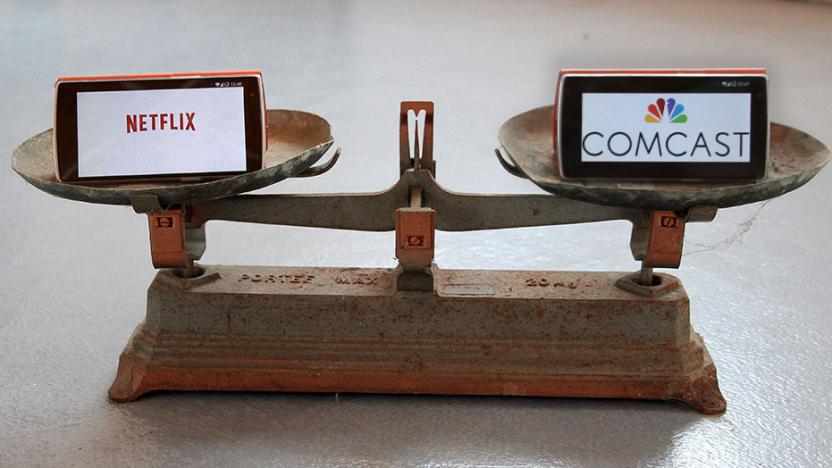
The fight for the open internet isn't over
The FCC's Open Internet order could be the most important 313 pages in the web's short history, but "could" is the operative word. Proponents of the order say it's a landmark document, promoting net neutrality and dissolving telcos' power over the internet; naysayers believe it's needless regulation over an already free market, and everyone else falls somewhere in between. So what does and doesn't the order do, and what exactly does it all mean for you?

If the internet had slow lanes, you'd still be waiting to read this article
Today is the internet's "Day of Action," an organized protest aimed at the Comcasts and Time Warners of the world from internet denizens, organizations, and companies. And some of the internet's biggies are on board: Netflix, Twitter, Dropbox, Reddit, Tumblr and more. Perhaps you noticed a widget on Netflix today (seen above)? That's part of the protest: not actually slowing down websites (which would no doubt frustrate users), but helping to enlighten users who might not know what net neutrality is. Wait -- are you one of those people? That's totally possible! Here's a quick summary: net neutrality is the internet as it exists today. All websites are created equal -- there are no websites that load noticeably faster or slower than others due to internet providers signing financial contracts with website owners/service providers. Today's protest is about keeping things that way.

FCC may revise the new net neutrality rules, but it's unlikely to satisfy critics
After pushback from a number of internet companies and even calls from within the FCC to delay a vote on the proposed new net neutrality standards, an FCC official has confirmed Tom Wheeler is making some changes. Detailed in a report by the Wall Street Journal, the (heavily criticized) general approach with the ability to sell faster delivery for some web content will be the same, but according to an unnamed official, will include language to make sure the FCC would have to make sure any deal doesn't put nonpaying companies at an unfair disadvantage. That will probably not meet the bar sought by most net neutrality advocates, and the updated rules are also said to stop short of calling for the reclassification of internet providers as common carriers under Title II.

FCC Chairman Wheeler talks tough on defending net neutrality, broadband competition and paid peering deals
Word of a new FCC proposal for net neutrality that could allow ISPs to discriminate between traffic on a "commercially reasonable" basis caused an uproar last week, and now Chairman Tom Wheeler has more to say about it. In a new blog post titled "Finding the Best Path Forward to Protect the Open Internet" he addresses many of the concerns raised about the rules some have suggested would effectively kill the concept of net neutrality, as well as other problems like a lack of competition between broadband providers and the interconnect deals Netflix has complained about reaching with ISPs like Comcast and Verizon. Wheeler called preserving the Open Internet "a priority" for the FCC, and claims "all options" are on the table -- including reclassifying internet providers so they can be regulated like phone companies or other utilities, a measure encouraged by consumer groups like Public Knowledge and Free Press. According to the chairman, the current proposal that's on the table for commentary exists to get something enforceable in place soon. Other choices, in his view, mean ignoring the court's previous ruling on net neutrality, or going in a whole new direction that could be tied up in courts for years. Saying "I won't hesitate to use Title II" (reclassification), if ISPs abuse the new rules and jeopardize the next Google or Amazon (Netflix was not mentioned) may put some more meat behind them. He claims that if anyone attempts to degrade the service of many for the benefit of few, the FCC will do everything it can to stop it. Now, we wait and see if that will mollify critics or satisfy Congress when he goes in front of the House Commerce Subcommittee on Communications on May 20th. Other issues the FCC is dealing with include those interconnection arrangements Netflix's Reed Hastings is so concerned about, and transparency requirements the chairman says will uncover any bad practices by ISPs like the ones Comcast and Verizon have been accused of. [Image Credit: Andrew Harrer/Bloomberg via Getty Images]
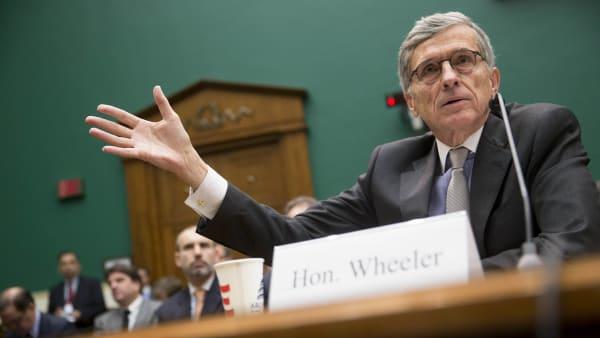
FCC claims it hasn't abandoned net neutrality at all, opens a new inbox for comments
Recent news that the FCC is drafting new net neutrality rules caused an uproar once it came out that they could let ISPs give certain traffic special access. That goes against the principles conventionally ascribed to net neutrality, which so far have required ISPs to treat any traffic on their networks the same. FCC Chairman Tom Wheeler called those claims "flat out wrong" in a short statement, and in a blog post titled "Setting the Record Straight on the FCC's Open Internet Rules" says his proposal does not abandon the FCC's earlier policies. According to the chairman, the proposed draft is simply following the roadmap established by the court when the previous net neutrality standards were struck down and "would establish that behavior harmful to consumers or competition by limiting the openness of the Internet will not be permitted." So, should you be worried about the new rules?

WSJ: FCC's new net neutrality rules mean ISPs don't have to be neutral (update: FCC responds)
After existing Open Internet, or net neutrality, regulations were struck down in court earlier this year, it appears the FCC is ready to come back with new ones. Re/code reports Chairman Tom Wheeler confirmed they will be on the table at an agency meeting May 15th. While that report indicates the rules will be the same, but justified under a different part of the law, the Wall Street Journal's sources say that new rules will be proposed tomorrow, with at least one notable change. According to the rumor, the new net neutrality rules will still bar ISPs from blocking certain sources over the last mile, but will allow them to sell special access to others. It sounds like the type of "managed connection" that Comcast, for example, is using to distribute video on-demand to its Xbox 360 app. Update: The FCC has issued a statement, calling reports that it will gut the Open Internet rule "flat out wrong" and saying there is no turnaround in policy, and behavior that harms consumers or competition will not be permitted. A report in the Associated Press mentions that deals between ISPs and service providers were possible under the old rules but frowned upon, but the new rules will establish actual standards for them, added so it can survive a court challenge in the future. We'll find out exactly what there is tomorrow when the draft is posted, but before that consumer advocacy groups like Public Knowledge and Free Press are already speaking out on the matter.

Outspoken Harvard professor Jonathan Zittrain to head FCC's open internet advisory panel
The FCC has created a new forum for corporations, experts and activists to scrap over web laws: The Net Neutrality Advisory Committee. Members have been tasked with "tracking and evaluating the effects of the FCC's Open Internet rules," as well as making policy recommendations. The new group is to be led by Harvard professor and long-time defender of an open internet, Jonathan Zittrain, whose appointment echoes that of Tim Wu -- another expert in a senior advisory position over at the FTC. Harvard University is no stranger to what can go wrong when open access is stifled, so perhaps the good professor can shake things up a bit.

Hackers planning homespun anti-censorship satellite internet
SOPA is making ordinary, decent internet users mad as hell, and they're not gonna take it anymore. Hacker attendees of Berlin's Chaos Communication Congress are cooking up a plan to launch a series of homemade satellites as the backbone of an "uncensorable (sic) internet in space." Like all good ideas, there's a few hurdles to overcome first: objects in lower-Earth orbit circle the earth every 90 minutes, useless for a broadband satellite that needs to remain geostationary. Instead, a terrestrial network of base stations will have to be installed in order to remain in constant contact as it spins past, at the cost of €100 ($130) per unit. The conference also stated a desire to get an amateur astronaut onto the moon within 23 years, which we'd love to see, assuming there's still a rocket fuel store on eBay.

Verizon appeals net neutrality rules, let the legal wrangling begin
We told you it was only a matter of time and, honestly, it took a bit longer than expected. Verizon has officially filed an appeal to the FCC's net neutrality rules, which are set to take effect on Novemeber 20th. It wasn't until the regulations were published in the Federal Register on September 23rd that they became fair game for legal challenges -- a technicality that resulted in Verizon's previous attempt to block the rules being tossed out by the US Court of Appeals in April. While Verizon senior vice president and deputy general counsel, Michael E. Glover, assures netizens that the company is "fully committed to an open Internet," it none-the-less takes issue with the FCC's attempt to institute new "broad" and "sweeping" regulations on the telecommunications industry. We're sure this is only the first of several cases that will be brought before the courts challenging the commission's authority. Stayed tuned to see if and when MetroPCS re-enters the fray, and to find out the ultimate fate of net neutrality here in the US. Check out the brief statement from Verizon after the break.

America may join the net neutrality parade on November 20th, if the courts let it
Well America, on November 20th you too will finally have net neutrality regulations all your own... provided the anticipated pile of lawsuits don't derail the process. The FCC will publish its "open internet rules" in the Federal Register tomorrow, making the regulations official. These are the same fairly modest proposals that were passed nearly a year ago over Republican opposition and, on that fateful day in November, they're scheduled to take effect. The rules have already faced challenges from Congress, Verizon and MetroPCS, but those suits were dismissed since the regulations technically didn't exist. After tomorrow though, any and all legal challenges will be fair game. Since the FCC is relying on its ancillary powers instead of reclassifying broadband as a Tier II service (similar to telephone landlines), those challenges could actually meet with success. If you need a refresher, just check out or guide to net neutrality as well as our interview with advocate and law professor Tim Wu. Now, we just have to wait and see what tomorrow will bring.

Telex anti-censorship system promises to leap over firewalls without getting burned
Human rights activists and free speech advocates have every reason to worry about the future of an open and uncensored internet, but researchers from the University of Michigan and the University of Waterloo have come up with a new tool that may help put their fears to rest. Their system, called Telex, proposes to circumvent government censors by using some clever cryptographic techniques. Unlike similar schemes, which typically require users to deploy secret IP addresses and encryption keys, Telex would only ask that they download a piece of software. With the program onboard, users in firewalled countries would then be able to visit blacklisted sites by establishing a decoy connection to any unblocked address. The software would automatically recognize this connection as a Telex request and tag it with a secret code visible only to participating ISPs, which could then divert these requests to banned sites. By essentially creating a proxy server without an IP address, the concept could make verboten connections more difficult to trace, but it would still rely upon the cooperation of many ISPs stationed outside the country in question -- which could pose a significant obstacle to its realization. At this point, Telex is still in a proof-of-concept phase, but you can find out more in the full press release, after the break.

Google gives Georgia Tech $1 million to build a benchmark for the open internet
You can benchmark the cycles of your CPU, power of your GPU, speed of your internet connection, and a myriad of other seemingly important things. However, there's one missing benchmark that could make all those seem rather frivolous: the openness of your connection. Google wants one and has just awarded Georgia Tech a $1 million grant over two years (with a possible $500k bonus for a third year) to come up with a benchmark capable of detecting just how neutral your net is. When ready, it'll look for any artificial throttling that's been set in place and will also check for evidence of digital censorship. No word on when an early version might see release, but hopefully it comes before we need to start paying extra for the ability to download non-ISP-approved content.











